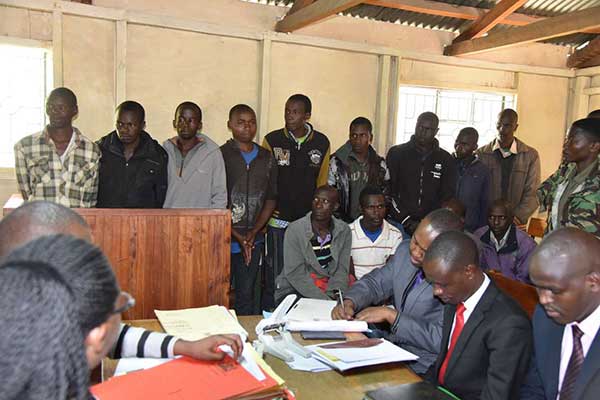By Sarah Nyakio
Access to justice and the right to a fair trial is still limited to the poor, vulnerable and marginalized groups in Kenya. Our journey started on Tuesday, September 26, at Kamiti YCTC Remand, Nairobi to provide legal aid to remandees.
ICJ Kenya is currently implementing a project titled “Decriminalization and Declassification of Petty Offences in Kenya”. The project seeks to promote respect for Human Rights and accountability for gross human rights violations, strengthen institutional capabilities, monitor implementation of the Constitution of Kenya 2010 and promote transparency and accountability.
For many people, coming in contact with the justice system can be a challenging and overwhelming experience due to its complexity. Particularly for poor and marginalized groups, the justice system can be difficult to understand and navigate due to obstacles, such as lack of financial resources and lack of awareness on how the justice system works.
Like most teenagers, Evans Obare 18, had a dream of joining the university, get a job and better his life and that of his family. However, his dreams were cut short when he got entangled in a love affair that saw him locked up at the age of 16. He was a form three student when he was arrested and charged with defilement.
“My girlfriend had come to my place to borrow a biology book when her father appeared outside my house with two police officers on August 16, 2016,” Evans explains.
He has been in Industrial Area Remand for two years. Despite being in remand for two years, Evans claims he has only been in court once where he took a plea at the Makadara Law courts. When we interviewed him, he said he had no idea what his case was about. This is contrary to the law which clearly states that every accused person has the right to a fair trial which includes the right to be informed of the charge, with sufficient detail to answer it.
Evans looking distressed and tears flowing freely on his cheeks said he did not have any sexual intercourse with his partner. His girlfriend at the time was 15 years old when Evans was apprehended.
According to the Kenyan Law, a person who commits an offence of defilement with a child between the age of twelve and fifteen years is liable upon conviction to imprisonment for a term of not less than twenty years.
Obare said his parents who are manual labourers, could not provide security of Kshs 300000 bond he was granted. He said that what he needs is a legal representation as he does not understand the trial process.
On the other hand, Nixon Kipanga was involved in a love triangle. His “wife” had another affair with a person he claims is a police officer. He was arrested on January 12, 2018, however, the matatu driver was arraigned in court on January 19, 2018.
“I spent seven days in a police cell without being informed what crime I had committed,” Kipanga told ICJ Kenya.
The Kenyan Constitution Article 49 clearly states that an arrested person has the right to be informed promptly, in a language that the person understands of the reason for the arrest. The arrested person should be brought before a court as soon as reasonably possible but not later than twenty-four hours after being arrested.
Nixon is facing two charges; possession of bhang, cocaine and heroin and trafficking of bhang, cocaine, and heroin.
He said that the complaint has never appeared before the court and no evidence has been brought before the court. Kipanga said he does not understand the trial process and requires legal representation to speed up his case.
Kipanga also claims that the charge sheet contains names of male witnesses’ whereas those who appeared before the court were female.
In Langata women’s remand, Edith Nduta Karanja 17, was charged with offensive conduct one week ago. Edith who is pregnant, claims her boyfriend’s mother accused her falsely after confronting her boyfriend about the pregnancy.
Nduta further informed us that her statement was never recorded at the police station. Most of the remandees we interviewed were not aware that they were supposed to record a statement or have statements of the complainants. Most of them did not have any statements with them. This is because many of the remandees did not understand their rights.
It is therefore imperative that the Kenya Justice system devises means of ensuring that the poor, vulnerable and marginalized can access legal aid services at the same time establishing longer-term measures for dealing with petty and minor offences.











